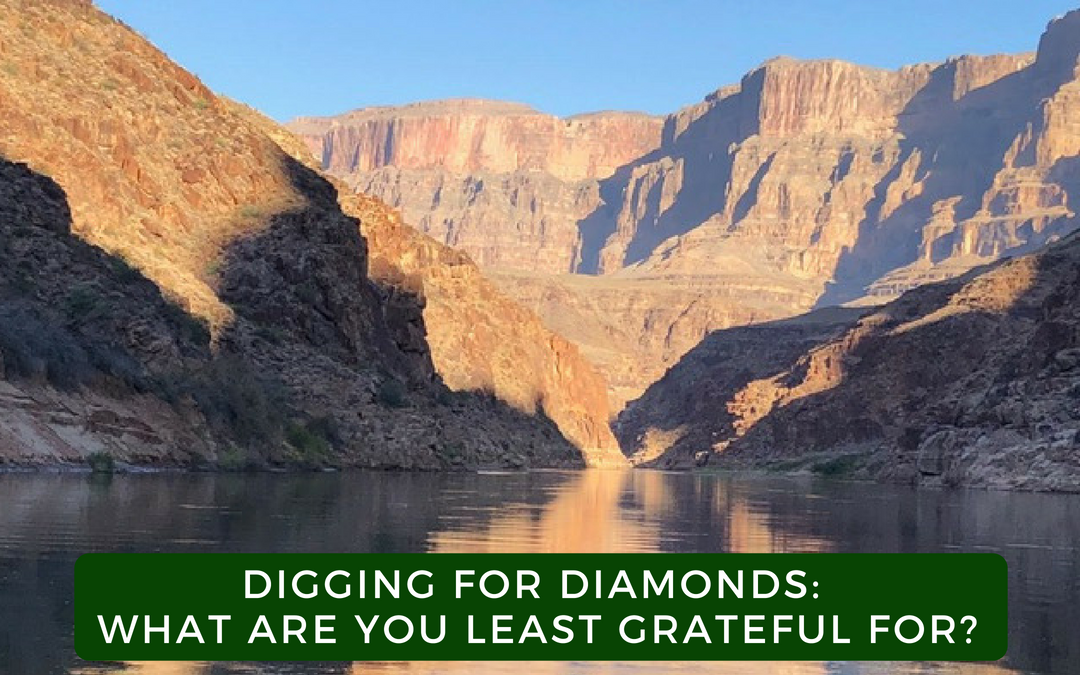Finding yourself in an unfamiliar place or a situation that pushes you past your comfort zone is one of the best ways to snap out of habitual ways of thinking.
That’s exactly what happened to me on my summer vacation. Having set off to the base of the Grand Canyon on a rafting and camping trip, I returned with a deep sense of gratitude for so many of things I take for granted.
Three aspects on the trip reminded me of what I value most — and one in particular caught me completely off guard.
The first was the restorative aspect of stunning natural beauty. Nothing compares with the full-on immersion of your five senses in the great outdoors. The rush of the river, morning birdsong, wafts of pine and the silent, timeless landscape of magnificent rock as the sunlight slowly creeps along layers of creamy orange, deep purple and chocolate hues. Much has been said about the restorative power of nature.
The second gift was the ability to be fully present with family and friends. Without Wi-Fi or decent phone coverage, I’ll be the first to admit that, for the first day or so, I felt edgy. Whenever we stopped for break along the Bright Angel path, I’d reach for my phone. It wasn’t until the second or third day that I stopped missing the chance to grab a few minutes screen-scrolling and started to relax into the slow pace of reconnecting with loved ones live and on a much deeper level. The irony of all of our digital connectivity is just how much it gets in the way of what makes human connections so powerful: creating memories together rather than just posting images for our “friends” to like and share; being able to listen deeply, not only to what someone is saying, but what they are not saying and how they seem in themselves that day; walking along in bouts of companionable silence; or laughing aloud (in real life, rather than LOL!!).
It was, however, a third unexpected aspect of the trip that provided the comfort zone test. That aspect can be neatly summed up in two words: COWBOY CAMPING.
Yes, I had known that the plan was to camp each night that our raft hit the shores of the Colorado river, but I had no idea it was going to be so hot. I had no idea that soaring temperatures would make “pitching our tents” a pointless exercise, not unless we wanted to bake inside them. Instead, I’d sleep in the great wide open on top of my sleeping bag and face my most primal of fears: scorpions, spiders, rattlesnakes. The lists of discomforts went on and included blisters, bugs and bites, limited access to make-shift toilets (better get your game on during breakfast or you don’t have another shot until dinner), and the contrasting freeze of splashing in 55 degree river water to rinse off the layers of accumulated dust.
And therein lies the lesson for me on this trip.
It’s one thing to know that you’re blessed to have your own comfy bed to sleep in at night, that you’ve got a shower that’s strong and hot, that you have A/C to live in a cool environment so you don’t spend your entire day sticky with sweat without any of these amenities awaiting the day’s end. It’s another to really, truly feel that gratitude — to appreciate, on a deep and visceral level, just how much you love your cool, clean sheets! How blessed I am indeed — when many in the U.S. and across the globe do not have these luxuries I’ve taken for granted.
And that got me thinking.
There’s a vast chasm (or indeed a canyon) between being vaguely aware that you’re blessed and feeling that gratitude deep in your bones. Most of the time you’re just too busy or caught up in routines. Our minds are designed to hunt for and pay attention to what isn’t working, not what is. On top of this, humans habituate: what we once desperately missed (a house, a job, a partner). . . we very soon take for granted once we have it.
And yet, gratitude, if we can just a find a way to tap into it and really feel it, is one of the most powerful of all leadership qualities. There’s decades of research demonstrating the link between a person’s ability to feel grateful and their mental, emotional, physical and spiritual health. People who are deeply grateful sleep better; they’re happier, more resilient, less toxic and form much stronger bonds. They make other people feel good, build stronger relationships and in general have much stronger social support and followership.
Research has also shown that while gratitude doesn’t always come naturally, it’s a muscle that gets stronger with practice.
Finally, it occurred to me as I stepped back into my office after my week’s retreat away from my everyday life, that even when we do remember to count our blessings, so often we completely overlook what we’re grateful for at work.
We’re grateful for our friends and family or where we live, or that we’re going on vacation! But what would happen if we learned to be more appreciative when we have interesting and varied tasks, that we have a job in the first place (never mind a career and, for some, even a calling); that our assistant is a rock-star; or of just how good the coffee is as we start the day?
These are the small and big pleasures worth noticing and amplifying. And so, I’ve returned from my vacation with this prescription for developing a deeper, holistic sense of gratitude:
1. Feel it: What are you grateful for? Today? At work? Right now? Pick just one thing that you can feel somewhere in your body. That feeling might be relief or energized attention or just the pleasure of the sun on your skin.
2. Express it: Gratitude isn’t just good for you, it makes you a better leader. Who in your life, especially at work where we often neglect the “niceties” of appreciating others, may not know how much you value their contribution? Tell them.
3. “Dig for diamonds” to find it in unexpected places: It’s one thing to feel grateful for life’s pleasures and privileges, it’s another to find the good in the bad. Take a problem that’s taxing you and flip it around. Ask yourself: what’s one good thing that has come of this? While you wouldn’t have chosen it, find the diamond — no matter how small — from the situation at hand.
While I was lucky enough not to get stung by a scorpion (3 others did), I was even luckier to be given the opportunity to find personal growth during my vacation. . .and that endures long after the vacation is over.
At Meritage, we coach leaders and their teams to help people break out of the limits of habitual thinking to boost their performance and effectiveness at work. Contact us for more information.



What an amazing adventure!
Fantastic article!